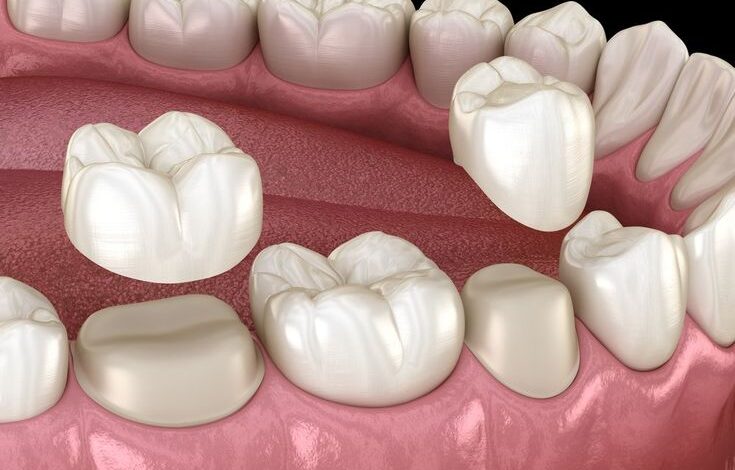Dental Crowns 101: Warning Signs You Shouldn’t Ignore

Dental crowns are a common solution for restoring damaged or weakened teeth. These custom-made caps cover the tooth, offering protection, functionality, and a natural appearance. However, like any dental work, crowns are not invincible. Over time, you might notice signs that something isn’t quite right with your crown. Knowing what to look for can help you address problems early and avoid more serious complications. This article will guide you through the signs, causes, and solutions for crown-related issues.
Types of Dental Crowns
Dental crowns Turkey come in a variety of materials, each designed to meet specific functional and aesthetic needs. Choosing the right type of crown depends on factors such as the tooth’s location, your budget, and your personal preferences. Here’s an overview of the most common types:
- Porcelain Crowns
- Highly popular for their natural, tooth-like appearance.
- Often used for front teeth due to their ability to mimic the translucency of natural enamel.
- Stain-resistant and durable, though not as strong as metal crowns.
- Ideal for patients who prioritize aesthetics.
- Ceramic Crowns
- Made entirely of ceramic material, offering a similar natural look to porcelain.
- Durable and biocompatible, making them a great choice for patients with metal allergies.
- Suitable for front and back teeth, although slightly less durable than porcelain-fused-to-metal crowns.
- Metal Crowns
- Crafted from alloys like gold, platinum, or base metals (e.g., nickel or chromium).
- Extremely durable and resistant to chipping or cracking.
- Ideal for molars and teeth that endure heavy chewing forces.
- Less popular for visible teeth due to their metallic appearance.
- Porcelain-Fused-to-Metal (PFM) Crowns
- Combines the durability of metal with the aesthetics of porcelain.
- The metal base provides strength, while the porcelain coating blends with natural teeth.
- Can sometimes show a thin metal line at the gumline, especially if gums recede.
- A versatile option for both front and back teeth.
- Zirconia Crowns
- Made from zirconium dioxide, a strong and biocompatible material.
- Offers excellent strength and a natural appearance, making them suitable for both front and back teeth.
- Resistant to chipping, cracking, and wear.
- Often preferred for patients seeking durability without compromising aesthetics.
- Composite Resin Crowns
- An affordable option made from a tooth-colored resin material.
- Less durable than porcelain or zirconia and more prone to staining or wear.
- Typically used as a temporary or short-term solution.
- Temporary Crowns
- Usually made from acrylic or resin and designed for short-term use.
- Placed while waiting for a permanent crown to be fabricated.
- Protects the tooth and maintains functionality during the interim period.
How Dental Crowns Work
Dental crowns serve as a vital restorative tool for preserving and protecting damaged teeth. Acting as a protective shield, crowns encase the visible portion of the tooth above the gum line, safeguarding it from further harm and restoring its functionality. They are particularly useful for teeth that have been weakened by decay, fractures, or extensive dental procedures, such as root canals.
Each crown is custom-designed to fit the unique shape and size of your tooth, ensuring a snug and comfortable fit. Before placing the crown, the dentist reshapes the affected tooth to create a stable base. This step involves removing any damaged or decayed portions and reducing the tooth to accommodate the crown’s thickness.
Lifespan of a Dental Crown
Dental crowns are designed to be durable, but like any dental restoration, they have a limited lifespan. On average, most crowns last between 5 to 15 years. However, their longevity depends on several factors, including the type of material used, your oral hygiene habits, and the amount of wear and tear they endure.
- Material Matters: Crowns made from stronger materials like metal or zirconia tend to last longer, often exceeding 15 years with proper care. Porcelain and ceramic crowns, while more aesthetically pleasing, may be slightly less durable and require replacement sooner, especially for teeth subjected to heavy chewing forces.
- Oral Hygiene: Proper care can significantly extend the lifespan of a crown. Brushing twice a day, flossing regularly, and attending routine dental check-ups help prevent issues like decay under the crown or gum disease, which could compromise its integrity.
- Lifestyle Habits: Certain habits can impact how long your crown lasts. If you grind your teeth (a condition known as bruxism), chew on hard objects like ice or pens, or frequently eat sticky or hard foods, your crown may wear down, crack, or loosen prematurely.
- Placement of the Crown: The location of the crown in your mouth also influences its durability. Crowns on molars, which endure the most chewing pressure, may have a shorter lifespan compared to those on front teeth.
Common Problems with Dental Crowns
- Pain or Sensitivity: Sensitivity shortly after crown placement is normal, but persistent pain could indicate an issue such as nerve irritation or an improper fit.
- Loose Crown: A crown may loosen due to wear, damage, or adhesive failure. A loose crown should be addressed immediately to prevent further complications.
- Chipped or Cracked Crown: Damage can occur from biting on hard objects or accidents. Minor chips might be repairable, but significant cracks may require replacement.
- Misaligned Bite: A poorly fitted crown can cause discomfort and may lead to difficulty chewing or jaw pain.
- Discoloration of the Crown: Although crowns are stain-resistant, discoloration can occur due to aging or staining of surrounding teeth.
- Gum Issues Around the Crown: Redness, swelling, or gum recession around the crown could indicate gum disease or irritation from the crown’s edges.
- Decay Under the Crown: If bacteria get under a crown, decay can develop. This often goes unnoticed until symptoms like pain or bad breath appear.
Warning Signs That Your Crown Needs Attention
- Persistent discomfort or pain
- Visible damage or wear
- Wiggling or movement when you touch the crown
- Changes in your bite or difficulty chewing
- Bleeding, swelling, or tenderness in the gums
Causes of Crown Problems
Crowns can face various challenges, including poor oral hygiene, teeth grinding (bruxism), accidental trauma, natural wear over time, and improper placement by a dentist. Understanding these causes can help you take preventive measures.
How to Prevent Crown Issues
Maintaining good oral hygiene, avoiding hard or sticky foods, wearing a night guard if you grind your teeth, and visiting your dentist regularly are all key to preserving your crown.
What to Do If You Suspect a Problem
If you notice an issue with your crown, schedule an appointment with your dentist. Temporary solutions like avoiding hard foods or using over-the-counter pain relievers can help manage discomfort until your visit.
Treatment Options for Crown Problems
Depending on the issue, your dentist may repair, replace, or adjust your crown. Gum disease or decay will require additional treatment, such as cleaning or removing the crown to address underlying issues.
Recognizing the signs of a problem with your crown is the first step toward maintaining your oral health. Regular check-ups, proper care, and prompt attention to issues can ensure your crown continues to protect your smile for years to come. If you’re experiencing discomfort or suspect a problem, don’t wait—schedule a visit with your dentist today for peace of mind and a healthier smile!
If you’re ready to ensure your dental crown is in top shape or need expert advice on crowns and other dental care, look no further than DentaVivo! Our experienced team of dental professionals is dedicated to providing personalized care in a comfortable, state-of-the-art environment.
Whether you’re dealing with discomfort, need a replacement, or simply want a thorough check-up, DentaVivo has the expertise to keep your smile healthy and radiant. Don’t wait for small issues to turn into bigger problems—schedule your appointment today and experience the exceptional care that thousands of happy patients trust. Let DentaVivo be your partner in achieving a confident, pain-free smile!


